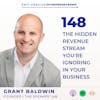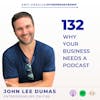How to Build a Recession Proof Business with Alejandra Santos

One thing that’s true about entrepreneurship is that the future is never certain. If you’re experiencing a recent pivot in your business, this episode reveals the two things you can do to find clarity whenever you find yourself in a season of change or uncertainty.
Is your business equipped to survive a recession?
As a financial analyst and consultant for some of today’s most-recognized brands, Alejandra Santos joins us today to walk you through the essential — but invisible — elements you need to build a recession-proof business so that you’re fully equipped to overcome unexpected financial setbacks.
Listen now and learn:
- The #1 way to increase sales in a slow economy
- How to make quick but wise decisions about your business finances
- How to recognize (and take advantage of) opportunities during a recession
- Why independent revenue streams can help you multiply your equity for a recession-proof business
Episode Links:
_____________
Liked this episode? Share it with a friend.
Love the show? Write a 5-star review (even just one sentence helps us keep bringing you the content you want to hear.)
Want to launch a Top 100 podcast of your own? Register for our next live workshop: Insider Secrets to a Top 100 Podcast
Private Podcast Feed: Insider Secrets to a Top 100 Podcast
Join 1500+ entrepreneurs and get access to the weekly Own Your Voice digital newsletter with cutting-edge insider tips on starting and growing a top-ranked podcast so you can create the greater influence, income, and impact you deserve.
Connect with Courtney:
Some product links on this site are affiliate links, which means we'll earn a small commission for any affiliate purchases you make (at no additional cost to you). We only recommend products that we use and/or personally trust, so you can browse with confidence.
All Rights Reserved | © The EffortLESS Life®
00:00:00 - Courtney Elmer
We've all heard it before: millionaires are made in recessions. But is your business equipped to survive a recession? Listen now and find out right here on antifragile entrepreneurship. Globally ranked among the top shows in business and education. We're known for helping overworked online business owners navigate the ups and downs on the way to seven figures each week. You're going to learn how to get the right systems, structure and support in place so you can build a self-sustaining business that thrives in a rapidly changing digital environment and grow through what you go through to create the greater income, influence and impact you deserve. This is AntiFragile Entrepreneurship™.
00:00:44 - Courtney Elmer
When the economy gets rocky, people get nervous, and rightfully so, because one of our basic human needs is to feel safe and secure. But the reality is, right now, the economy is down, sales are down, and our morales as business owners are down. But on the other hand, opportunities are in high supply if you know where to look for them. And no, I am not talking about going out and scooping up real estate deals overseas. What I am talking about is learning how to recognize and take advantage of the massive opportunities that are right here in our own backyard. Because the truth about a downward turn in the economy is that it reveals problems in your business that you might otherwise never know about until it's too late.
00:01:28 - Courtney Elmer And that's a good thing because most problems are 100% fixable when you know what you're dealing with. And that's why I invited Alejandra Santos to join me here on the show today. She's a financial analyst, an exit strategist, and a top consultant for some of today's most recognized brands. And she's here to walk you through the essential but invisible elements that you're going to need if you want to build a recession proof business so that you're fully equipped to overcome any unexpected financial setbacks. Because here's the real secret about being at rock bottom: having nothing to lose means you've got everything to gain. Alejandra, welcome. I am delighted to have you here to share your story.
00:02:23 - Alejandra Santos
No, thank you, Courtney, for making the time for me today.
00:02:26 - Courtney Elmer
Absolutely. So I would love to start there with your story because you faced tremendous adversity during your early years here in the United States, including just struggling to meet your basic needs, all while pursuing your education and holding on to the belief that you could create something great and do something amazing. So tell us your story. Also, I'm curious to hear how you believe that this experience really shaped your approach to entrepreneurship and resilience in the face of the challenges that we all face in our lives, especially as entrepreneurs.
00:03:02 - Alejandra Santos
Okay, so where do I start? Long story. To summarize, I came to this country when I was 17. I had just turned 17 at the time. And although I am an American citizen, I was born here and everything. I still face a lot of the challenges that people, when they come here and don't have any family or support system, face. So I think that's what really worked out: that muscle in my brain that knows, doesn't give and just continues pushing forward. I mean, I've landed in Miami out of all the places, which is a great place to live, but however, it's a very crazy town for someone with no support system or anybody to be at. So that presented a lot of challenges for me. A lot of challenges to going to school. The fact that my parents were not around, they were not in the country, and they were dead presented a lot of monetary issues. And I had to basically cry my way into college to graduate. I went to the financial aid office and just told my story, and they felt some kind of remorse and empathy for me. So they were able to submit even more grants or more applications for loans because you get tapped out at a certain level. That's my story. I basically built it myself from the bottom up. I had no car. I bought a car at some point. I did a lot of different jobs while I was in school to put myself on a roof and be able to survive.
00:04:34 - Alejandra Santos
And once I graduated, which was in Virginia, because I did a whole state living migrating situation, that's when I started actually searching for jobs in my career field. But lucky me, 2008 came, the market crashed, and I graduated in finance, so that took a whole another turn for me because there were no jobs, right? I mean, you think right now it's really bad. Back in 2008, there were serious no jobs. The economy was everybody lost their homes. So that right there gave me another lesson. I was in New York at the time, I had to move back to Virginia because I couldn't afford New York, and then it was another lesson for me. So what do I do now? And that's when I really pivot into businesses. That's when I really found myself into helping recession proof business owners with their finances. And I did it through a lot of different organic companies.
00:05:34 - Alejandra Santos
Right at the time, it was for this top 20 top ten CPA firm in America that decided to grab me because obviously, they were still making money. That's one of the fields that still makes money, no matter when the economy crashes or not. So I learned a lot of really good skill sets there. It was in California that I was introduced to entrepreneurship because back in the day, entrepreneurship didn't have a strong presence in a lot of states as it does now all over America or worldwide. Entrepreneurship is a very celebrated venture fund. It was not a big prominent thing back then. So California introduced me to entrepreneurship. I worked for really great startups as an employee and then as a consultant. And having those kinds of two experiences, internal and external, when I decided that it was time to take on business by myself and just do my own thing and put that expertise to play with entrepreneurs as a consultant. So that's what I continue to do.
00:06:38 - Courtney Elmer
What I admire so much about you and about your story is that no matter what obstacle you faced, you never gave up, not once. And I'm curious: do you feel like setbacks like the ones that you experienced can help us better navigate the financial challenges we all experience in starting and scaling a recession proof business?
00:07:02 - Alejandra Santos
So everything that you do in your personal life really does translate into your work life. That's something that I've seen across, even habits, working out, staying in a routine, those little habits really do make a big impact in your work life and how you treat if you are a business owner, how you treat your business and how you keep going. The one thing that really taught me resilience was obviously my life, but also, I came from an entrepreneurship family. My mom had her own finance business; my father was a recession proof business owner all his life. So, I was taught from a very young age how to do inventory too. I was probably three or four when my father was like, count how many are here and then record it here, and this is how you do inventory. So I had that background, but it wasn't like how life shook me in every sense of the way that I was able to create more of a foundation of resilience. And I see it with my clients, and I see it with myself. There's not going to be a success is not a straight line where you just go up all the way. You go up and down. And that's how it is. And there's beauty in every stage. I think that when my company, January to April, May, is really busy because we have so many projects going on and then May comes down. And I'm actually very grateful for May coming out in June, for that being a slow month for me, just because I need that balance and I need that mental health.
00:08:34 - Alejandra Santos
And I think as an entrepreneur, you should be grateful for those slow moments because those moments will help you get that strength for the higher season. And I feel like a lot of people just freak out. They're like, oh my God, my business is slowing down. We see it as a trend, right? That's why we do a lot of trend analysis when it comes to financial work. We want to see exactly what affects the seasonality in your business. And if your recession proof business depends on you and only you, like, if you're the face of the business, then that will be attached a lot to your mental health, to your behaviour patterns, to how you feel about the market. But if your business depends on a lot of other factors, then that's not just going to be depending on you. What I'm trying to say is that as an entrepreneur, you have to find beauty in every stage, and yes, it does affect your finances. If your recession proof business only depends on you, it will affect your finances 100%. Your mood and your mental health are a clear reflection of that.
00:09:30 - Courtney Elmer
This is so key. I want to make sure that those listening right now really hear what you're saying because many of the people who listen to this podcast and a lot of the business podcast out there are building personal brands. And this was something that, in the early days of my recession proof business, I resisted. I didn't want to build a personal brand. I wanted my brand to be personal, but I didn't want it to be me. And so I kind of went off track there under the advice of a lot of people, coaches, mentors that I had hired, peers, colleagues, saying, no Courtney, it is about you. It is your brand. You have to build this personal brand. And so I started trying to build that, but then it felt so inauthentic to my vision and what I saw for the company and the growth of the company.
00:10:13 - Courtney Elmer
So I had to reset those expectations and realign things to get them back on track to be building a business that, yeah, it's human, yeah, it's personal, but it's not a personal brand. But there are people out there who are building personal brands. They might be a speaker, an author, or some kind of thought expert thought leader. So what would you say to those people? You hit the nail on the head when you said everything in your recession proof business, especially as a personal brand, is going to come back to you and your mental state at any given point, whether that mental state is being influenced by external circumstances or by something inwardly that you're going through, or maybe both. How do you help your clients, and what advice would you give to people who maybe are navigating a really difficult season right now to understand that it is, that it is just a season? How do we begin to grow through that?
00:11:07 - Alejandra Santos
So that's a really good question. I do have clients that they have a lot of personal brands. And what I try to advise is to create more revenue streams that are not around you 100% of the time. And that is because it's really hard for one person to hold a fork all the time. It's just impossible. We're human beings. We have to be empathetic with one another. I have to be empathetic to myself sometimes. I have bad days, I have good days, and that's how life is. So creating that extra revenue flow that does not depend on you really will make you feel like the business is still going afloat and continue steady while you come back again for air. So those are the few things that I advise my clients because I do work with a lot of personal brands. And the other one is that you see it. Everybody's going through the economy is really interesting right now. A lot of people are slowing down sales because they don't have disposable income to spend on products. And that's how it is. So, collaborate with other people that also have personal brands. You want to tap into their target, into their market, into their customer base. They want to tap into your customer base. Collaboration is key. I feel like there is really magic with businesses that are partners. I understand why people become partners in a recession proof business. It takes a lot of the stress away from one another. So, if you are a solo entrepreneur and you have a personal brand, you probably have other solo entrepreneurs in your network try to work with them because you will be surprised how much you can make money out of their own customer base. So those are the few things that I tell my clients.
00:12:44 - Courtney Elmer
Yeah, that makes a lot of sense. I want to circle back to what you said about the economy because I feel like, to some degree, we tend to blame the economy for the financial problems that we experience in our recession proof business. And while there might be some truth to that, that the economy looks different right now than it has in the past, then it might in the future, to what degree do you find that people tend to just kind of say, oh, it's economy; therefore I'm either not going to work as hard, or I'm going to work harder? Right. How it impacts and influences how they're showing up in their business and how they're running the recession proof business as a result of the economy, which is an external factor that they can't really control.
00:13:23 - Alejandra Santos
So that's interesting. They say that going back to the beginning, where you ask about resilience, right? That it all ties in. Some people who are prognostic look at the economy like, oh, this is an opportunity for me to create some innovation, the product innovate, a service, create a hook to bring customers in, to create more revenue flow that goes back to resilience. Are you resilient enough to see it as an opportunity, or are you not resilient enough? And you look at this like a time to step back and a time to just wait it out or write it out. Right. So it all goes back to resilience, honestly, because there's opportunity. I mean, businesses flourish when the market is bad. It's a proven science, proven fact. So if you create if you continue making money while the economy is bad, then you're proof to be resilient within your recession proof business.
00:14:15 - Courtney Elmer
Yeah. And this is so key to this idea of resilience and because, you know, as I've shared on the show before if you're listening for the first time, anti-fragility is not a word that I came up with. This is a word that a risk analyst came up with by the name of Naseem Taleb. He's an author, and he studied financial markets. This was where he began to get this idea, and he started to look at different companies and businesses and then broadened that to how this actually plays out in all different sectors, even in nature, in our own human beings. And looking at how these entities that could adapt and grow through whatever the difficult thing was became more resilient. They became antifragile because there was nothing that could actually stop the growth. And you can think of it like a natural disaster because when you have a good forest fire that burns everything down, it's really essential for the new life that's about to come forth, right? And there's that period of dormancy in between.
00:15:21 - Courtney Elmer
And we can look at our businesses this way, too. Sometimes, when things are disruptive and there's a big shift happening, there's a period of dormancy, and that's when it gets hard. That's when we're like, oh my gosh, I don't know if I have it in my tank to keep going. I don't know if I have enough money in my bank account to make it through this. Right. But then it goes back to what you're saying about seizing opportunity. So my question for you is, how can we recognize opportunity, especially when we're not conditioned to look for it or whenever we overthink it, and try to wait it out to see how this is going to play out? How can we get better at being quick to make decisions but making sure those are wise decisions to keep our recession proof business moving in a forward direction?
00:16:06 - Alejandra Santos
So the opportunity is interesting. The opportunity happens all day, every day. You just have to be very aware. I mean, I get emails about prospects, clients or projects and things like that, and either I turn it around, I say, no, it's not for me, or I jump in it, right? Opportunity happened. Or you can go outside, do business development, talk to someone, and then suddenly you have a new opportunity. So you just have to be very aware that's what I like about being an entrepreneur is that one day you may think, oh my God, what am I going to do? I don't have money in my bank account. The next day, you have a big project again, and we pay you $20,000. And that's what I love about it. It's that up-and-down motion that you know in yourself. You're confident enough to know that you'll be okay no matter what the external situation is. Internally, you are just okay. And you know your opportunity is going to land on you, and you're going to make the best out of it.
00:17:00 - Alejandra Santos
There is an art to that, though not a lot of people see opportunity when it comes to them. It has to be something really transparent and really clear, with the Green Arrow saying, jump here for them to do it. And it all comes down to what kind of person you are. I would suggest I read a lot of Positivity books and motivation, and there are a lot of things that I do in the morning to clear my head and give me that focus that I need when something jumps at me. Then, if I feel like it's a good project, I will do it. I mean, I can go very technical and say, let's cost, risk analysis, benefit all, reward all. These kind of nice words. But if we face it, nobody's going to sit down and make a really detailed reward analysis. When something jumps at you, you sometimes just have to go with your gut, I would say, as an entrepreneur. But if you do have the time, you can always do a reward cost analysis and see if it's a good fit for you.
00:17:57 - Courtney Elmer
So I'm really curious then about your morning routine. Like, what is it that you do personally in the morning, really just to get your mind right for the day to be open to those opportunities? The very first thing that you said a moment ago is opportunity is everywhere. It's everywhere every day. And I think part of it is just adopting that mindset, right? But beyond that, what else can we do? What else can we do to really open ourselves up to that so that we don't miss those opportunities when they come?
00:18:20 - Alejandra Santos
So, personally, everybody has their own routine. But personally, I like to wake up and like I said, I read something motivational. Right now, I'm doing the Principles of Abundance and reading them every day. I kind of meditate on them because their language is very complex. I break it down into little parts and digest it, and I want to see what that means to me and tap really into my subconscious mind. Because in reality, I don't know, I think like this: we do attract everything that we do feel internally that it's not really to our surface that we have to really bring to the surface. So I work a lot on that. Meditation is big in the mornings and at nighttime before I go to sleep and then just kind of like making sure that when you're doing your meditations, you think, okay, whatever comes to me today is because I am bringing it towards me on that day. So, I got to be open and grateful for the good and the bad. And the bad is not that bad because as long as you're breathing and you have a roof over your head, the bad is not that bad.
00:19:29 - Courtney Elmer
Yes. That brings to mind something my father-in-law always says, and we might be over there for dinner, and he's explaining about something difficult he experienced that day, and he's like, but you know what? If this is the worst thing that happened to me today, then I'm doing all right. And it's just such a perspective shift, right? It kind of grounds you immediately because you're like, yeah, you know what? There are a lot of things to be grateful for. We all know the power of gratitude. We know we should be experiencing time in that state of gratitude and trying to get ourselves there every day, even if it's just for a moment. But sometimes, it's easy to forget.
00:20:00 - Alejandra Santos
I usually say if it's not meant for me, it's not meant for me. There is a reason why that deal did not go through. There is a reason, like attachment, not to be attached to the outcome in order to feel light and grateful through the day, because knowing that perhaps that didn't work out, but something else and bigger will work out for you. It's a good way to live your day and go through it because you do miss your deal. I miss deals all the time. It's part of the recession proof business. And I just say, oh, okay, well, next, let's move it on.
00:20:29 - Courtney Elmer
I love this attitude. I mean, you just have such a light-hearted attitude about it, and it's not like a let's whitewash, it toxic, positivity it type of attitude. But it's like, let's just actually lean into what it's like to be optimistic and to trust both ourselves and in the opportunities that come across our desk to say, yeah, this door opened, this one didn't, and to not hold on so tightly to the ones that didn't. I had an experience this past week where there's a conference that I've spoken at an industry conference in the past years, and I've done their virtual events, and I've been very involved with this conference. So, of course, I applied as a speaker again this year, and I didn't get selected to speak. So I emailed him back, and I'm like, Look, I would love to know why because if it is an opportunity for me to improve, I want to improve. But then also I had to sit with that and actually be like, you know what?
00:21:20 - Courtney Elmer
Even though this was something I expected to happen, the door closed. I don't know why it closed, but I'm also just okay with waiting to see what else unfolds because it closed. And that's hard. There's an art to it. There's a discipline to it. It's difficult to do. And so I'm curious when you're working with clients when they're experiencing maybe a down season in sales or profits are down, maybe there's an expectation there that they're going to meet what they did last year or exceed it, but that's just not what's showing up on paper. So where should we be looking in our businesses right now to be able to fine-tune and adjust and maybe steer things back on track to the degree that we can?
00:22:06 - Alejandra Santos
So that's a really good question. It really depends on the industry. For example, if you are selling a product. We are very industry-agnostic, so I can relate to a lot of different industries. But if you're selling the product, I usually like down sales to look internally and see what's working and what's not working. And it's a good opportunity again to see if the suppliers that I'm using are working for my business or they're not working. Do I need to innovate more of my product? What do my customers want? Is this, like you said, an economy thing, which, in reality, you can always do a little bit more market, reach it somewhere else? So it's a good opportunity. I have a lot of clients whose sales right now are down because of a lot of different factors. And some of those factors can be internal as well because they're going through a few changes or marriage. There are just so many other personal relationships that you have to take care of. And when you have a personal brand, it does affect you. Everywhere, we look inward to see what's working and what's not working and how we can improve upon it. But for me, going down on sales is an opportunity to look in on what's working and what's not working. How can we improve when sales are going up? Nobody's really looking at what's working and what's not working. It's when they go down that we start zooming in and start making efficiencies movements into the company.
00:23:29 - Courtney Elmer
Right. And then rather than internalizing it and making it mean something about you that it likely doesn't mean, like, oh my gosh, all of a sudden you're obsolete, or your expertise isn't good enough, or whatever other things would make it mean. Actually, looking at it as an opportunity, as you've been telling us this entire conversation, like, seeing it as an opportunity, like, yeah, the sales are down. Yeah, you might be feeling some extra stress and pressure right now. Let's get the magnifying glass out, and let's take a look at what's really going on because that will give you renewed energy. I know the times in my recession proof business when I've been in a season like that where things are down, and rather than just kind of white-knuckling my way through it, I actually get curious about it. It always gives you some kind of information that you can capitalize on and that you can take the next actionable steps.
00:24:14 - Courtney Elmer
It's so refreshing to hear someone like you who has helped such large companies scale and grow, and you've seen it all and you've got the personal experience to back it up, your own personal story playing into this and what you've done for yourself and what you're able to help other companies do. And so it is really refreshing to have someone like you here today to say, you know what? Sometimes, it's not really about the numbers as much as it is just shifting our perspective just a little bit and then giving it enough time to see that come to fruition. Alejandro, thank you for being here today. Thank you for all that you've shared. For those who would love to connect with you and continue learning from you, where's the best place for them to do that?
00:24:53 - Alejandra Santos
So we are everywhere, but you can connect with me through LinkedIn. Alejandra Santosharaptandim. I come out as soon as you Google it, so there I am. Or through the website StartupTandem.com.
00:25:03 - Courtney Elmer
So, Alejandra, thank you for being here today. I so appreciate you.
00:25:07 - Alejandra Santos
No, thank you, Courtney. I appreciate the time.
00:25:09 - Courtney Elmer
And speaking of taking advantage of opportunities, one of the easiest places that you can improve your profitability right now is to master the art of closing more sales on your discovery calls, which I know tends to be the one place that we, as mission-driven entrepreneurs and not sales professionals, tend to lose more deals than we close. And you don't need me to tell you how much this hurts your bottom line. And that's why next week, I've got a renowned expert in sales training joining us to show you how you can increase your closing rates by 50% or more with communication that converts. So, if you're a business owner who is looking to improve your sales and increase your revenue right now, then I promise you, you are not going to want to miss this. So join me right back here next week. And until then, let's go out there and grow through what we go through together.

Alejandra Santos
CEO and Founder
Alejandra Santos comes with 14 plus years of experience in accounting and finance consulting. She has experience with nonprofits, restaurants, real estate, wealth management, and startups. She landed in Miami from Honduras at the age of 17 with no support, money, or family. During her first few years in the US, she struggled to keep a roof over her head and food on her table, while at the same time pursuing an education.
Her drive and resilience kept her going forward, she knew in her core that she was destined to create amazing things. Because of education and job opportunities, she has lived in Orlando, DC, VA, and NYC. She graduated from high school at 16 to start her professional journey pursuing a degree in International Business, and Marketing at UNITEC in Honduras. In Orlando she obtained her Business Management degree from Valencia College, then moved to Washington DC where she obtained her B.S. in Finance from George Mason University and her Accounting degree from Northern Virginia College.
In California she earned her Executive Master’s degree from Pepperdine University in March 2022. Alejandra continues to enrich her education by attending educational seminars and obtaining certificate programs. She comes from an entrepreneur family, making her empathetic to the struggles and challenges entrepreneurship present.








